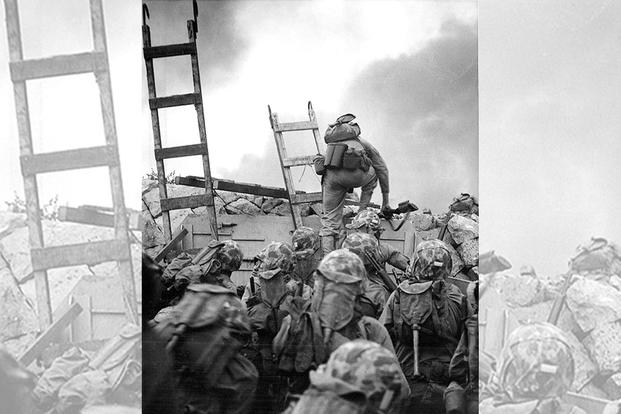One of the Korean War's most indelible images that of a young Marine scaling a wall during the invasion of Inchon on Sept. 15, 1950. Pictured with his torso poised over the battlement, 1st Lt. Baldomero Lopez of Tampa, Fla., is the picture of indomitable military courage.
Lopez, the son of Spanish immigrants, enlisted in the Navy in 1943 but was quickly tapped to attend the U.S. Naval Academy and joined the Marines after graduation. Today, a picture of Lopez and a citation hang outside his academy room. "As a plebe, when you face a lot of challenges ... I'd go to Baldomero Lopez's room and read that citation, which gave me the necessary inspiration to keep going," says retired Marine Corps Gen. Tom Draude.
Draude's inspiration came from Lopez's actions immediately after the immortal photograph at Inchon was taken. After climbing the seawall and exposing himself to enemy fire, the 25-year-old Lopez pulled the pin from a hand grenade, intending to throw it into an enemy pillbox. But as he lifted his arm to throw, enemy fire blasted into his right shoulder and chest, forcing him to fall backwards and drop the live grenade. Instead of letting it roll away, the critically wounded lieutenant dragged himself forward to the grenade. Unable to grasp it firmly enough to hurl it towards the enemy, he swept the grenade beneath him and absorbed the full impact of its explosion. Lopez's actions are credited with saving at least 30 men, and thus the citation outside of his old room at the academy is for the Medal of Honor awarded to him posthumously by President Harry S. Truman.
In 1999, the State of Florida dedicated the Baldomero Lopez State Veterans Nursing Home. Draude served as master of ceremonies. Lopez gazed out at the assembled crowd from a black-and-white photograph, reminding everyone of Gen. Douglas MacArthur's message after the Sept. 15 invasion: "The Navy and Marines have never shone more brightly than this morning."















